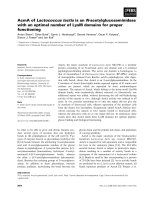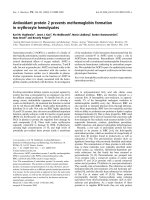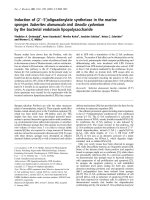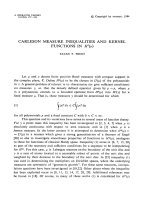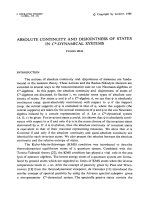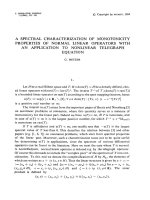Báo cáo toán học: " For each α 2 there is an infinite binary word with critical exponent α" docx
Bạn đang xem bản rút gọn của tài liệu. Xem và tải ngay bản đầy đủ của tài liệu tại đây (91.8 KB, 5 trang )
For each α > 2 there is an infinite binary word with
critical exponent α
James D. Currie
∗
& Narad Rampersad
†
Department of Mathematics and Statistics
University of Winnipeg
Winnipeg, Manitoba R3B 2E9
CANADA
e-mail: ,
Submitted: Feb 28, 2008; Accepted: Aug 25, 2008; Published: Aug 31, 2008
Mathematics Subject Classification: 68R15
Abstract
The critical exponent of an infinite word w is the supremum of all rational numbers
α such that w contains an α-power. We resolve an open question of Krieger and
Shallit by showing that for each α > 2 there is an infinite binary word with critical
exponent α.
Keywords: Combinatorics on words, repetitions, critical exponent
1 Introduction
If α is a rational number, a word w is an α-power if there exist words x and x
and a
positive integer n, with x
a prefix of x, such that w = x
n
x
and α = n + |x
|/|x|. We refer
to |x| as a period of w. A word is α-power-free if none of its subwords is a β-power with
β ≥ α; otherwise, we say the word contains an α-power.
The critical exponent of an infinite word w is defined as
sup{α ∈ Q | w contains an α-power}.
Critical exponents of certain classes of infinite words, such as Sturmian words [8, 10] and
words generated by iterated morphisms [5, 6], have received particular attention.
Krieger and Shallit [7] proved that for every real number α > 1, there is an infinite
word with critical exponent α. As α tends to 1, the number of letters required to construct
∗
The author’s research was supported by an NSERC operating grant.
†
The author is supported by an NSERC Post-doctoral Fellowship.
the electronic journal of combinatorics 15 (2008), #N34 1
such words tends to infinity. However, for α > 7/3, Shur [9] gave a construction over a
binary alphabet. For α > 2, Krieger and Shallit gave a construction over a four-letter
alphabet and left it as an open problem to determine if for every real number α ∈ (2, 7/3],
there is an infinite binary word with critical exponent α. Currie, Rampersad, and Shallit
[3] gave examples of such words for a dense subset of real numbers α in the interval
(2, 7/3]. In this note we resolve the question completely by demonstrating that for every
real number α > 2, there is an infinite binary word with critical exponent α.
2 Properties of the Thue-Morse morphism
In this section we present some useful properties of the Thue-Morse morphism; i.e., the
morphism µ defined by µ(0) = 01 and µ(1) = 10. Note that |µ
s
(0)| = |µ
s
(1)| = 2
s
for all
s ≥ 0.
Lemma 1. Let s be a positive integer. Let z be a subword of µ
s+1
(0) = µ
s
(01) with
|z| ≥ 2
s
. Then z does not have period 2
s
.
Proof. Write µ
s
(0) = a
1
a
2
. . . a
2
n
, µ
s
(1) = b
1
b
2
. . . b
2
n
. One checks by induction that
a
i
= 1 − b
i
for 1 ≤ i ≤ 2
n
, and the result follows.
Brandenburg [1] proved the following useful theorem, which was independently redis-
covered by Shur [9].
Theorem 2 (Brandenburg; Shur). Let w be a binary word and let α > 2 be a real
number. Then w is α-power-free if and only if µ(w) is α-power-free.
The following sharper version of one direction of this theorem (implicit in [4]) is also
useful.
Theorem 3. Suppose µ(w) contains a subword u of period p, with |u|/p > 2. Then w
contains a subword v of length |u|/2 and period p/2.
We will also have call to use the deletion operator δ which removes the first (left-most)
letter of a word. For example, δ(12345) = 2345.
3 A binary word with critical exponent α
We denote by L the set of factors (subwords) of words of µ({0, 1}
∗
).
Lemma 4. Let 00v ∈ L, and suppose that 00v is α-power-free for some fixed α > 2. Let
r = α. Suppose that 0
r
v = xuy where u contains an α-power. Then x = and u = 0
r
.
Proof. Suppose that u has period p. Since 00v ∈ L, v begins with 1. Since 00v is α-
power-free, we can write u = 0
s
v
, where x = 0
r−s
for some integer s, 3 ≤ s ≤ r, and
v
is a prefix of v. If 0
p
is not a prefix of u then the prefix of u of length p contains the
the electronic journal of combinatorics 15 (2008), #N34 2
subword 0001. Since α > 2, this means that 0001 is a subword of u at least twice, so that
0001 is a subword of 00v. This is impossible, since 00v ∈ L.
Therefore, 0
p
is a prefix of u, and u has the form 0
t
for some integer t ≥ α. This
implies that u has 0
r
as a prefix, so that x = and u = 0
r
.
Lemma 5. Let α > 2 be given, and let r = α. Let s, t be positive integers, such that
s ≥ 3 and there are words x, y ∈ {0, 1}
∗
such that µ
s
(0) = x00y with |x| = t. Suppose
that 2 < r − t/2
s
< α and 00v ∈ L is α-power-free. Then the following statements hold.
1. The word δ
t
µ
s
(0
r
v) has a prefix which is a β-power, where β = r − t/2
s
.
2. Suppose that 00v contains a β-power of period p for some β and p. Then δ
t
µ
s
(0
r
v)
contains a β-power of period 2
s
p.
3. The word δ
t
µ
s
(0
r
v) is α-power-free.
Proof. We start by observing that µ
s
(0
r
) has period 2
s
. It follows that δ
t
µ
s
(0
r
) is a word
of length r2
s
− t with period 2
s
, and hence is a (r2
s
− t)/2
s
= β-power.
Now suppose u is a β-power of period p in 00v. Then µ
s
(u) is a β-power of period 2
s
p
in µ
s
(00v). However, µ
s
(0
r−1
v) is a suffix of δ
t
µ
s
(0
r
v), since t < 2
s
= |µ
s
(0)|. Thus µ
s
(u)
is a β-power of period 2
s
p in δ
t
µ
s
(0
r
v).
Next, note that µ
s
(0
r−1
v) does not contain any κ-power, κ ≥ α. Otherwise, by
Theorem 3 and induction, 0
r−1
v contains a κ-power. This is impossible by Lemma 4.
Suppose then that δ
t
µ
s
(0
r
v) contains a κ-power ˆu of period q, κ ≥ α. Using induction
and Theorem 3, 0
r
v contains a κ-power u of period q/2
s
. By Lemma 4, the only possibility
is u = 0
r
, and q/2
s
= 1. Thus q = 2
s
.
Since 00v ∈ L, the first letter of v is a 1. Since ˆu has period 2
s
, by Lemma 1 no
subword of µ
s
(01) of length greater than 2
s
occurs in ˆu. We conclude that either ˆu is a
subword of δ
t
µ
s
(0
r
), or of µ
s
(v), and hence of µ
s
(0
r−1
v). As this second case has been
ruled out earlier, we conclude that |ˆu| ≤ |δ
t
µ
s
(0
r
)| = r2
s
− t. This gives a contradiction:
ˆu is a κ-power, yet |ˆu|/q ≤ (r2
s
− t)/2
s
= β < α.
By construction, δ
t
µ
s
(0
r
v) has the form 00ˆv where 00ˆv ∈ L.
We are now ready to prove our main theorem:
Theorem 6. Let α > 2 be a real number. There is a word over {0, 1} with critical
exponent α.
Proof. Call a real number β < α obtainable if β can be written β = r − t/2
s
, where r, s, t
are positive integers, s ≥ 3, and the word obtained by removing a prefix of length t from
µ
s
(0) begins with 00. We note that µ
3
(0) = 01101001 and µ
3
(1) = 10010110 are of length
8, and both contain 00 as a subword; for a given s ≥ 3 it follows that r and t can be
chosen so that β = r − t/2
s
< α and |α − β| ≤ 7/2
s
; by choosing large enough s, an
obtainable number β can be chosen arbitrarily close to α.
Let {β
i
} be a sequence of obtainable numbers converging to α. For each i write
β
i
= r
i
− t
i
/2
s
i
, where r
i
, s
i
, t
i
are positive integers, s
i
≥ 3, and the word obtained by
the electronic journal of combinatorics 15 (2008), #N34 3
removing a prefix of length t
i
from µ
s
i
(0) begins with 00. If 00w ∈ L, denote by φ
i
(w)
the word δ
t
i
µ
s
i
(0
r
i
w).
Consider the sequence of words
w
1
= φ
1
()
w
2
= φ
1
(φ
2
())
w
3
= φ
1
(φ
2
(φ
3
()))
.
.
.
w
n
= φ
1
(φ
2
(φ
3
(· · · (φ
n
()) · · · )))
.
.
.
By the third part of Lemma 5, if 00w ∈ L is α-power-free, then so is φ
i
(w). Since 00
is α-power-free, each w
i
is therefore α-power-free.
By the first and second parts of Lemma 5, w
n
contains β
i
-powers, i = 1, 2, . . . , n.
Note that is a prefix of φ
n+1
(), so that
w
n
= φ
1
(φ
2
(φ
3
(· · · (φ
n
()) · · · )))
is a prefix of
φ
1
(φ
2
(φ
3
(· · · (φ
n
(φ
n+1
())) · · · ))) = w
n+1
.
We may therefore let w = lim
n→∞
w
i
.
Since every prefix of w is α-power-free, w is α-power-free but contains β
i
-powers for
each i. The critical exponent of w is therefore α.
The following question raised by Krieger and Shallit remains open: for α > 1, if
α-powers are avoidable on a k-letter alphabet, does there exist an infinite word over k
letters with critical exponent α? In particular, for α > RT(k), where RT(k) denotes the
repetition threshold on k letters (see [2]), does there exist an infinite word over k letters
with critical exponent α? We believe that the answer is “yes”.
Acknowledgments
We would like to thank the anonymous referee for helpful comments and suggestions.
References
[1] F J. Brandenburg, “Uniformly growing k-th power-free homomorphisms”, Theoret.
Comput. Sci. 23 (1983), 69–82.
[2] A. Carpi, “On Dejean’s conjecture over large alphabets”, Theoret. Comput. Sci. 385
(2007), 137–151.
the electronic journal of combinatorics 15 (2008), #N34 4
[3] J.D. Currie, N. Rampersad, J. Shallit, “Binary words containing infinitely many
overlaps”, Electron. J. Combin. 13 (2006), #R82.
[4] J. Karhum¨aki, J. Shallit, “Polynomial versus exponential growth in repetition-free
binary words”, J. Combin. Theory Ser. A 104 (2004), 335–347.
[5] D. Krieger, “On critical exponents in fixed points of binary k-uniform morphisms”.
In Proc. STACS 2006, LNCS 3884, Springer-Verlag, 2006, pp. 104–114.
[6] D. Krieger, “On critical exponents in fixed points of non-erasing morphisms”, Theo-
ret. Comput. Sci. 376 (2007), 70–88.
[7] D. Krieger, J. Shallit, “Every real number greater than 1 is a critical exponent”,
Theoret. Comput. Sci. 381 (2007), 177–182.
[8] F. Mignosi, G. Pirillo, “Repetitions in the Fibonacci infinite word”, RAIRO Inform.
Theor. Appl. 26 (1992), 199–204.
[9] A. M. Shur, “The structure of the set of cube-free Z-words in a two-letter alphabet”
(Russian), Izv. Ross. Akad. Nauk Ser. Mat. 64 (2000), 201–224. English translation
in Izv. Math. 64 (2000), 847–871.
[10] D. Vandeth, “Sturmian words and words with a critical exponent”, Theoret. Comput.
Sci. 242 (2000), 283–300.
the electronic journal of combinatorics 15 (2008), #N34 5
